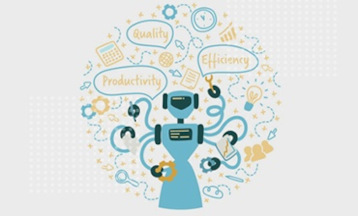In the ever-evolving landscape of technology, the need for robust application support that adapts and improves continually is paramount. Traditional methodologies are giving way to more dynamic approaches like Agile, heralding a new era of application support and maintenance. This blog explores the significance of Agile methodologies and further innovations that promise continuous improvement in application support services.
Understanding Agile Methodologies
Agile methodologies revolutionized software development by prioritizing flexibility, collaboration, and iterative development. Applying Agile principles to application support allows teams to respond swiftly to changing requirements, enhance customer satisfaction, and maintain a competitive edge. The iterative nature of Agile ensures that improvements are ongoing and aligned with user needs.
The Impact of Agile on Application Support
Agile methodologies, such as Scrum or Kanban, are reshaping the way application support is approached. Through shorter development cycles, frequent updates, and continuous feedback loops, support teams can address issues promptly, incorporate user feedback rapidly, and streamline the maintenance process. This approach fosters a more responsive and customer-centric support system.
Beyond Agile: Innovations for Continuous Improvement:
While Agile has been a game-changer, advancements beyond Agile methodologies continue to enhance application support services. Here are some key innovations:
DevOps Integration: Combining development and operations streamlines workflows, leading to faster deployment, better collaboration, and improved stability in application support. DevOps promotes a culture of collaboration and communication among development, operations, and support teams. In application support, this means breaking down silos between these teams to foster seamless cooperation and shared responsibilities.
AI and Machine Learning: Leveraging AI-driven analytics helps predict and prevent potential issues, enabling proactive maintenance and reducing downtime. AI and ML algorithms analyze historical support data to predict potential issues. This proactive approach allows support teams to anticipate problems and resolve them before they impact users, reducing downtime and improving reliability. AI-powered chatbots and virtual assistants handle initial user queries, providing immediate assistance, guiding users through troubleshooting steps, and escalating complex issues to human support agents when necessary. This instant support improves response times and user satisfaction.
Automation Tools: Implementing automation for routine tasks accelerates processes, allowing support teams to focus on higher-value activities. Automation tools such as Nagios, SolarWinds, or Prometheus help in monitoring application performance, infrastructure health, and system metrics. They trigger alerts and automated responses when predefined thresholds are breached, enabling proactive issue identification and resolution. Tools like Tableau, Power BI, or Google Data Studio automate data analysis and reporting. They collect, analyze, and visualize support data, providing insights for informed decision-making and identifying trends for improvements.
Cloud-Based Support Solutions: Utilizing cloud technology offers scalability, flexibility, and accessibility, facilitating smoother support and maintenance operations. Cloud-based support solutions have transformed the landscape of application support services, offering numerous advantages that enhance efficiency, scalability, and flexibility. Cloud-based support solutions enable support teams to access applications, tools, and resources remotely from anywhere with an internet connection. This accessibility allows for faster response times and uninterrupted support services.
The Role of Continuous Improvement
Continuous improvement (CI) is a fundamental principle driving application support services. By embracing a culture of learning, adapting, and evolving, support teams can stay ahead in a dynamic tech landscape. Regular retrospectives, knowledge sharing, and skill development initiatives play a pivotal role in fostering improvement. CI ensures that application support services evolve continuously, leading to improved service quality. Regularly identifying and implementing refinements based on user feedback and changing requirements elevates the support provided, resulting in better user experiences. CI encourages a proactive approach to problem-solving. It involves constant analysis of support processes, enabling teams to identify recurring issues and implement preventive measures. This results in quicker issue identification, resolution, and reduced downtime for applications.
Challenges and Considerations
Despite its benefits, implementing Agile and other innovations in application support isn’t without challenges. Overcoming resistance to change, ensuring team alignment, and managing complexities in transitioning processes require thoughtful planning and commitment. Resistance to change is common when introducing new methodologies or altering established processes. Some team members might be resistant to adopting new approaches like Agile methodologies due to a preference for traditional practices. Transitioning to new methodologies or integrating innovative technologies may require new skill sets. Ensuring that the team has the necessary training and support to adapt to these changes is crucial. Integrating new tools, technologies, or methodologies into existing support systems can be complex. Compatibility issues with legacy systems or applications might arise, requiring careful planning and integration strategies. Emphasizing quick issue resolution while maintaining high-quality support can be challenging. In Agile environments, the focus on rapid iterations might sometimes conflict with delivering robust, thoroughly tested solutions. Aligning stakeholder expectations with the iterative nature of continuous improvement can be challenging. Managing expectations regarding timelines, deliverables, and the evolving nature of support services is essential for transparent communication. Implementing new technologies, especially AI-driven solutions, may raise concerns about data privacy and security. Ensuring compliance with regulations and safeguarding sensitive information is crucial. In some organizations, different teams might work in silos, hindering effective communication and collaboration. Breaking down these barriers and fostering a culture of cross-functional collaboration is essential for successful CI implementation.
The evolution from traditional approaches to Agile methodologies and beyond has reshaped application support and maintenance services. Embracing Agile principles, integrating innovative technologies, and committing to continuous improvement are pivotal for delivering efficient, customer-centric support in today’s fast-paced tech environment. As the landscape evolves, staying adaptable and embracing new innovations will be key to thriving in the realm of application support. Connect with https://www.zinemind.com/ to learn more about Advancing Application Support.













